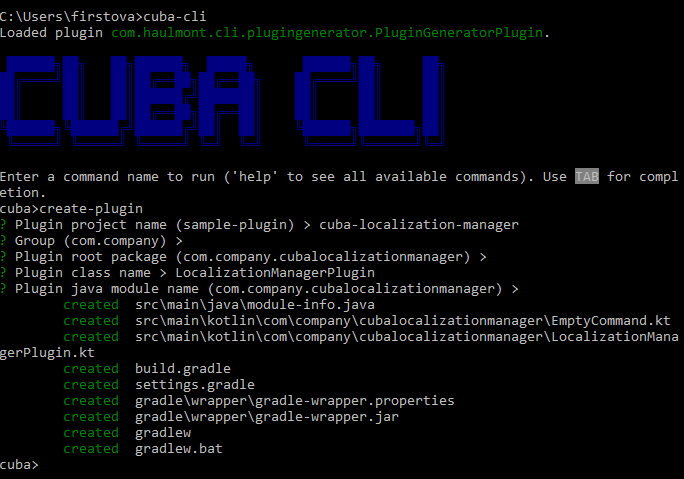Prerequisites
First of all, you need to install CUBA CLI in your system.
Also, the JDK 10 installation required.
Develop your own plugin
We will use CUBA CLI Plugin Generator to create a new CUBA CLI plugin. Install this plugin as it is described below:
- Download the plugin.
- Copy .jar file into
~/.haulmont/cli/plugins/directory. - Open a terminal and start CUBA CLI using
cuba-clicommand.
It will print loaded plugins:
cuba:~/$ cuba-cli
Loaded com.haulmont.cli.plugingenerator.PluginGeneratorPlugin
After that, run the create-plugin command. CLI will ask you questions about the project. If a question provides a default answer, you can press enter to accept it. You should fill the following parameters:
- Plugin project name – the project name. Enter the plugin name.
- Group – the Maven project group
- Plugin root package – the root package of Java classes
- Plugin class name – This class will be our plugin entry point. Must end with
Pluginpostfix. - Plugin java module name – the Java module name

Import project into IDE:
- Open IntelliJ IDEA
- File → Open, navigate to project directory, choose
build.gradle, pressOK. - In Gradle settings choose
Use gradle 'wrapper' task configuration. - Press
OK.
When the project is loaded open the plugin class to add new commands.
In our example, we will create a command that will add a new localization to the project.
In the beginning, we add the method that will register our plugin command.
@Subscribe
fun onInit(event: InitPluginEvent) {
event.commandsRegistry {
command("add-locale", AddLocale())
}
}
First of all, there is no sense, if command invoking not in CUBA project directory. So add project existence check.
override fun preExecute() = checkProjectExistence()
Insert the rest of the code that checks the existing locales and allows users to add a new locale name and code to the project.
override fun run() {
val foundProperties = listOf(
projectStructure.getModule(ModuleStructure.WEB_MODULE).rootPackageDirectory.resolve("web-app.properties"),
projectStructure.getModule(ModuleStructure.CORE_MODULE).rootPackageDirectory.resolve("app.properties")
).filter {
Files.exists(it)
}.map {
Properties(it)
}
// Fing the existing locales in the project
val foundLocales = foundProperties.flatMap {
it["cuba.availableLocales"]?.split(";")?.map { localeString ->
val nameCodeSplit = localeString.split("|")
return@map if (nameCodeSplit.size == 2) {
Locale(nameCodeSplit[0], nameCodeSplit[1])
} else null
}?.filterNotNull() ?: listOf()
}.toSet()
if (foundProperties.isEmpty())
fail("Unable to find appropriate .properties files")
val existingCodes = foundLocales.map { it.code }.toSet()
val existingNames = foundLocales.map { it.name }.toSet()
if (foundLocales.isNotEmpty()) {
printWriter.println("There are following locales are found:")
for (locale in foundLocales) {
printWriter.println("${locale.name} - ${locale.code}")
}
}
// New locales creating
val newLocales = Prompts.create {
repeating("locales", "Add new locale?") {
question("code", "New locale code") {
validate {
val promptedCodes = (answers["locales"] as List<Answers>).mapNotNull { it["code"] as String? }
if (value in existingCodes || value in promptedCodes)
fail("The code already exists")
checkRegex("[a-z]+", "Locale code must contain only lower case latin letters")
}
}
question("name", "New locale name") {
validate {
val promptedNames = (answers["locales"] as List<Answers>).mapNotNull { it["name"] as String? }
if (value in existingNames || value in promptedNames)
fail("The name already exists")
checkRegex("[A-Za-z]+", "Locale name must contain only latin letters")
}
}
}
}.ask().let {
it["locales"] as List<Answers>
}.map {
Locale(it["name"] as String, it["code"] as String)
}
// Add newly created locales to the project properties
if (newLocales.isNotEmpty()) {
val localesStringToAppend = newLocales.joinToString(separator = ";") { locale -> "${locale.name}|${locale.code}" }
for (properties in foundProperties) {
properties["cuba.availableLocales"] = (properties["cuba.availableLocales"]?.let { "$it;" }
?: "") + localesStringToAppend
properties.save()
}
}
}
data class Locale(val name: String, val code: String)
In terminal execute ./gradlew installPlugin. Now, cli will load your plugin on startup. Let’s test it.
- In terminal execute
cuba-cli. - Run
create-app. Fill the parameters. - Run
add-locale. - Open the
app.propertiesandweb-app.propertiesfile in your project - Check, that the new localization is added.
This is a short example of the CLI plugin. For more advanced examples, please refer to the #cuba-cli tag on Github.